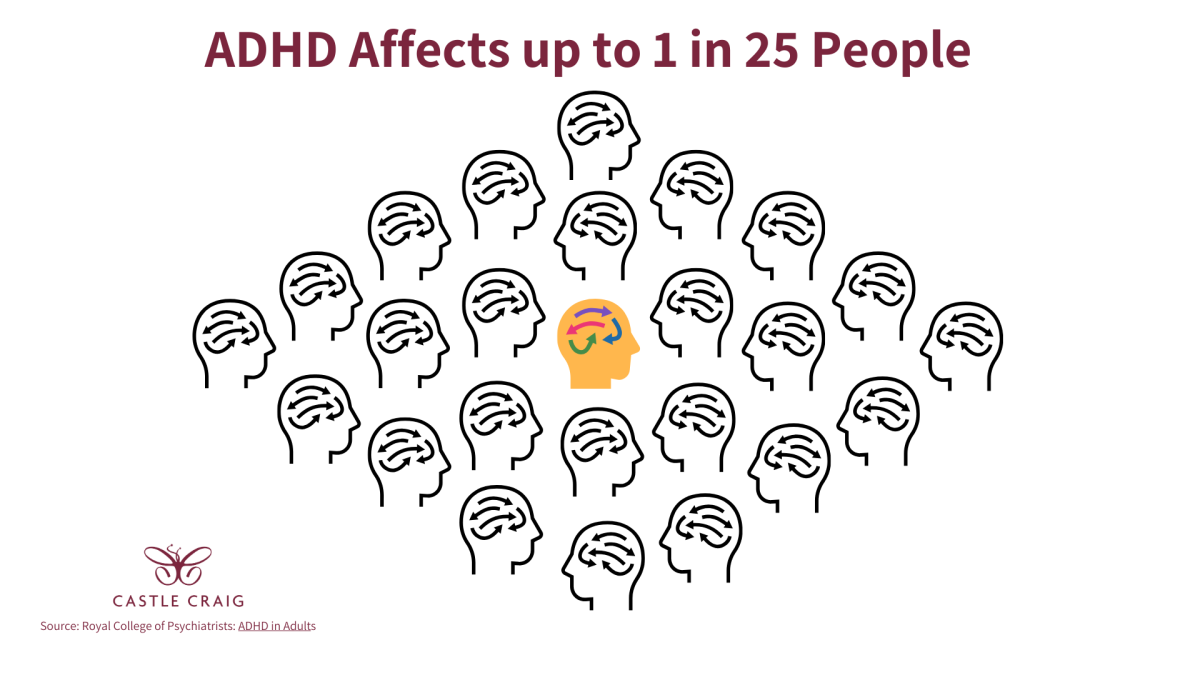
Inpatient Treatment for Co-occurring Disorders
When facing the complexities of addiction and ADHD, finding comprehensive support is vital. At Castle Craig, we specialise in dual diagnosis treatment, offering integrated care for drug and alcohol dependency and mental health within our private residential setting in the Scottish Borders. We understand the intricate connection between ADHD and addiction, providing a clear path to healing and sustained well-being.
If you are looking for inpatient addiction treatment in the beautiful Scottish countryside, our dedicated team is ready to guide you. Call us on 01721 546 263 to discuss how our integrated approach can help you or someone you care about. For those seeking information on the relationship between ADHD and addiction, including its impact on recovery, please read on for more guidance.
What is ADHD?
Attention Deficit Hyperactivity Disorder (ADHD) is a condition that affects up to 1 in 25 adults. 1 It is a neurodevelopmental condition that affects how people regulate attention, impulses and activity levels. Characterised by a persistent pattern of inattention and/or hyperactivity-impulsivity that interferes with functioning or development, ADHD begins in childhood and can continue through to adulthood.
ADHD can significantly impact various aspects of daily life, including school, work, relationships and self-management. Its symptoms might include difficulty focusing, restlessness, disorganisation and impulsive decisions. Understanding ADHD helps in finding effective strategies and support to manage its effects and improve overall well-being. People with Attention deficit hyperactivity disorder are more likely to experience mental health difficulties and develop substance use disorders, such as alcohol or drug addiction.

Different Types of ADHD
It’s important to recognise that while many people with ADHD struggle with hyperactive symptoms, this is not the case for everyone. As many as a quarter of people with ADHD have problems with concentration, but not with hyperactivity or impulsiveness.2
This means that for many people, their ADHD symptoms are less obvious and may go unnoticed and undiagnosed. As a result, some individuals start to use drugs or alcohol as a way to self-medicate and manage their symptoms.
According to the charity ADHD Aware, there are three main types of ADHD.6
Type 1: Inattentive type
Symptoms are less to do with impulsivity or hyperactivity, and more about inattention, such as:
- finding it hard to focus and being easily distracted
- getting bored quickly
- losing items
- trouble following directions
Type 2: Hyperactive/impulsive type
Characterised by symptoms of impulsivity and hyperactivity, such as:
- difficulty sitting still
- talking constantly
- impatience
- not thinking about consequences
Type 3: Combined type
The combined presentation is the most common type of ADHD, where a mix of inattentive and hyperactive-impulsive symptoms is present. While ADHD is a lifelong condition, its impact and the severity of symptoms can fluctuate over time. Understanding this variability helps in managing its effects throughout life.
What is ADHD & Addiction as a Co-Occurring Disorder?
A co-occurring disorder means a person is living with ADHD alongside a substance misuse issue. This dual diagnosis arises when ADHD symptoms like impulsivity or difficulty with self-regulation lead to drug or alcohol use as a coping strategy. People may seek relief from ADHD challenges, inadvertently developing an addiction.
The relationship between attention deficit hyperactivity disorder and addiction is intricate. Untreated ADHD can make recovery from substance misuse more difficult, while drug or alcohol use can worsen ADHD symptoms. Effective rehab treatment for ADHD and addiction requires an informed approach, addressing both substance addiction and mental health concurrently for a comprehensive path to well-being and lasting sobriety.

Rehab for Substance Addiction and ADHD
What is ADHD and Addiction Rehab Treatment?
Attention deficit hyperactivity disorder (ADHD) and addiction treatment is a specialised kind of care for co-occurring conditions. It recognises that both issues need to be addressed at the same time for recovery to work. This helps people manage both their ADHD and their substance addiction.
The goal of this treatment is to help a person find stability in their mood and behaviour. Support includes managing ADHD symptoms while also tackling drug or alcohol addiction. By giving dedicated focus to both concerns, patients can learn healthier ways to live and gain control over their lives.
Symptoms of ADHD and Its Link to Addiction
ADHD symptoms typically fall into three main categories: inattention, hyperactivity and impulsivity. Inattention involves difficulty focusing, sustaining attention or following through on tasks. Hyperactivity-impulsivity often appears as excessive fidgeting, restlessness or acting without thinking. These core features can affect various aspects of a person’s functioning.
- Inattention: Struggling to focus on a task or concentrate.
- Hyperactivity: Restlessness, fidgeting or difficulty sitting still.
- Impulsivity: Saying or doing things without thinking about the consequences.
In daily life, ADHD symptoms can show as forgetfulness in routines, disorganisation or struggling with time management. People may find it hard to wait their turn in conversations or interrupt others frequently. Completing lengthy tasks might feel overwhelming, and maintaining consistent effort can be a constant challenge. These signs and symptoms include: 2
- losing things
- forgetfulness
- interrupting others
- mood swings
- difficulty managing stress
- starting new tasks before finishing previous ones
- impatience
- taking risks
Free Assessment for ADHD and Addiction
We offer free ADHD and substance addiction assessments as part of our admissions process.
Relationship Between ADHD and Substance Misuse
Research has shown that people with ADHD are more likely to experience mental health difficulties, including substance use disorders, depression, anxiety and bipolar disorder.1 They may turn to drug or alcohol misuse as a way to cope with symptoms like restlessness, inattention or emotional dysregulation. This attempt at self-medication can, unfortunately, pave a path towards developing a dependency.
This relationship often becomes a complex cycle, where drug or alcohol misuse can intensify ADHD symptoms, making concentration and emotional regulation even more difficult. Understanding this intricate interplay is vital for effective substance addiction treatment. Rehab centres that accommodate both ADHD and substance misuse concurrently offer the most promising path to lasting well-being.
Why Are People With ADHD More at Risk of Addiction?
It’s important to understand why people with ADHD might have a higher chance of addiction. There is a close link between these conditions, involving how their brain works, their ways of dealing with things and things around them. This section looks at why this happens, helping to make the reasons clearer.
-
The Role of Dopamine in ADHD and Addiction
Dopamine is a neurotransmitter that plays a key role in the brain’s reward system, helping us to feel pleasure. It is involved in mood regulation and impulse control, and accounts for much of the link between ADHD and alcohol addiction. People with ADHD have dysregulated dopamine systems and so are constantly seeking activities or substances that will increase their dopamine levels, such as drinking alcohol. 5
This dopamine-seeking behaviour can create a vicious cycle. Alcohol may temporarily increase dopamine levels and provide a false sense of relief, but this can lead to dependence, as the brain starts to rely on alcohol in order to release dopamine. Some medications, such as stimulant medications which increase noradrenaline and dopamine reuptake, have been shown to decrease dopamine-seeking behaviours, and therefore reduce the risk of developing addiction to alcohol.
-
Impulsivity in ADHD and Addiction
The very nature of ADHD means people are more prone to impulsive behaviour and seeking new sensations. This trait can lead to trying different substances, often at a younger age. Such early experimentation significantly increases the likelihood of developing a drug or alcohol addiction.
For those with ADHD, managing impulsivity is crucial in preventing substance misuse. The desire for immediate gratification or novel experiences can override caution. Understanding this connection is a vital step towards building strategies that support healthier choices and long-term well-being.
-
Difficulties Managing Thoughts and Emotions
People with ADHD often have lower self-esteem and tend to be more sensitive to rejection and criticism (sometimes referred to as having Rejection Sensitivity Dysphoria). They can also experience emotions differently, which can be overwhelming. Such overwhelm can result in shutting down and being unable to function until feelings have been processed.
Similarly, intense emotions can build up and lead to an emotional meltdown, resulting in anger or crying episodes. Emotional dysregulation like this is thought to affect around half of adults with ADHD.6 What’s more, people with ADHD can find themselves caught up in a confused mix of thoughts and emotions.7 Using drugs and alcohol can help to dampen down this internal noise.
-
Mental Health Conditions
People living with ADHD frequently experience co-occurring mental health conditions like depression and anxiety. Such conditions are recognised to heighten the risk of developing a substance addiction. The emotional distress or challenges associated with depression and anxiety can lead people to seek relief through drug or alcohol misuse.
Successfully addressing these additional mental health conditions is crucial for long-term recovery from drug or alcohol addiction. Integrated ADHD treatment that simultaneously tackles depression or anxiety provides a more comprehensive path to well-being. This approach helps reduce relapse risk by managing all interconnected challenges effectively.
-
Stress and Burnout in ADHD and Addiction
Living with ADHD can often lead to heightened stress and burnout. Challenges with organisation, focus or managing daily tasks can create persistent feelings of overwhelm. This continuous strain exhausts mental resources, leaving people vulnerable to burnout. The effort of navigating everyday life with ADHD symptoms contributes significantly to this emotional fatigue.
When experiencing such intense stress or burnout, people may unfortunately turn to drug or alcohol misuse as a temporary escape. This attempt to self-medicate can worsen both ADHD symptoms and substance addiction, creating a damaging cycle. Addressing stress management is therefore a vital component of integrated ADHD treatment for lasting recovery.
-
Peer Pressure and Social Isolation
Peer pressure can significantly influence substance misuse, especially for people with ADHD. Challenges with impulsivity or a strong desire for social acceptance might make one more susceptible to external influence. This can lead to experimenting with drug or alcohol addiction, even when knowing the risks, in an effort to fit in with certain social circles.
Conversely, symptoms of ADHD sometimes contribute to feelings of social isolation or difficulty maintaining relationships. This sense of being alone can unfortunately push people towards substance misuse as a way to cope with loneliness or emotional distress. Addressing both social well-being and addiction is crucial for comprehensive ADHD treatment.
-
Alcohol or Drugs as Self-Medication for ADHD
People with ADHD often struggle with regulating their emotions and managing stress, and so can be more prone to self-medicating behaviours. Using alcohol as a replacement for childhood self-soothing behaviours, such as thumb sucking, can lead to adult dependency.
As many people with ADHD remain undiagnosed or unable to access appropriate support, using drugs and alcohol can become a way to try and manage symptoms. Managing ADHD in a world designed predominantly for neurotypical people can be stressful, and some people with ADHD start using substances as a coping mechanism to navigate everyday life. Over time this can lead to addiction, with the person becoming more and more dependent on substances to function.
-
Brain Structure Similarities in ADHD and Addiction
Studies show there are physical similarities between the brain structure of adults with ADHD and those with a substance use disorder.8 Both ADHD and addiction involve dysregulation in similar brain circuits, particularly those related to reward and executive function. Neurotransmitters like dopamine, crucial for pleasure and motivation, often show differences in functioning in both conditions. These overlapping neurobiological factors can explain why people with ADHD may be more predisposed to developing substance misuse.
Understanding these shared brain characteristics is vital for effective ADHD treatment. An integrated approach that addresses these underlying biological commonalities, alongside behavioural and psychological therapies, offers a more comprehensive path to long-term recovery. It helps manage cravings and improve self-regulation.

ADHD and Addiction Diagnosis
Diagnosing co-occurring ADHD and substance addiction requires an in-depth assessment that examines both conditions. This dual diagnosis process involves understanding how ADHD symptoms might contribute to drug or alcohol misuse, or how substance use affects ADHD presentation. A comprehensive evaluation helps clarify the intricate relationship between the two challenges.
The diagnostic process for ADHD and addiction can be complex, as symptoms may overlap or mask each other. For example, impulsivity from ADHD might resemble impulsive substance use, or chronic substance misuse could mimic attention difficulties. Accurate diagnosis by experienced professionals is vital for developing an effective, integrated addiction treatment plan for ADHD patients.
Treatment for ADHD and Addiction
Effective ADHD treatment for people also struggling with substance addiction requires an integrated approach. Addressing both conditions simultaneously is crucial, as they profoundly influence each other. Trying to treat only one often leads to challenges in managing the other, hindering long-term recovery from drug or alcohol misuse.
Such comprehensive care typically combines a clinical understanding of ADHD symptoms with various behavioural and psychological therapies for drug or alcohol addiction. This combined strategy helps people develop vital coping mechanisms, manage impulsivity and improve focus. The goal is to build resilience and support sustained well-being, paving the way for a healthier lifestyle.
-
Dual Diagnosis Treatment for ADHD and Addiction
Dual diagnosis treatment is essential when ADHD co-occurs with substance addiction. This integrated approach addresses both conditions simultaneously, recognising how their symptoms frequently intertwine and complicate recovery. A unified strategy is vital to truly heal the underlying psychological and behavioural links.
At Castle Craig, we provide integrated residential addiction treatment specifically for people facing this dual diagnosis in the Scottish Borders. Our skilled team delivers comprehensive care designed to heal both ADHD challenges and drug or alcohol addiction. We support you in gaining the necessary tools for well-being and sustained sobriety.
-
Medically Managed Detox for ADHD Patients
Medically managed detox is a crucial first step for people experiencing ADHD alongside substance misuse. This process focuses on safely stabilising a person’s physical health, managing withdrawal symptoms. It addresses the immediate physiological impact, creating a secure foundation before comprehensive drug addiction treatment can begin.
This initial phase also allows for early support in managing ADHD symptoms, which can intensify during withdrawal. People might experience heightened restlessness, profound difficulty concentrating or increased impulsivity. Combining caring medical oversight with early strategies for accommodating ADHD creates a more stable start to recovery, preparing patients for ongoing therapies in addiction rehab.
-
Private Inpatient ADHD and Addiction Treatment
Private inpatient rehab centres for ADHD and addiction treatment offer a dedicated setting for people managing co-occurring conditions. People reside within the facility, benefiting from a structured, immersive and discreet environment. This allows for concentrated healing away from external triggers and daily pressures, providing a vital opportunity to focus fully on recovery from drug or alcohol misuse.
At Castle Craig, our private inpatient ADHD and addiction treatment provides comprehensive support in the Scottish Borders. We offer a wide range of evidence-based therapies, addressing both ADHD challenges and substance addiction simultaneously within our residential setting. Our approach helps people rebuild their well-being and develop sustainable coping strategies for long-term sobriety and mental health.
-
Long-term Rehab Treatment for ADHD and Addiction
Long-term rehab treatment is often crucial for enduring recovery from ADHD and substance addiction. This extended period allows for a deeper understanding of both conditions and their complex interplay. It provides ample time to address the root causes of drug or alcohol misuse while developing strategies to manage ADHD symptoms effectively, supporting integrated healing.
Such extended care significantly aids in developing robust coping mechanisms for ADHD challenges, like impulsivity or emotional dysregulation. It also strengthens skills for navigating substance misuse, preparing people for life outside treatment. This sustained approach builds resilience, helping to prevent relapse and cultivate a stable, healthier lifestyle.
-
Confidential, Discreet ADHD and Addiction Treatment
Seeking ADHD and addiction treatment in a confidential, discreet rehab setting offers significant peace of mind. This private option allows you to focus fully on your recovery journey, removed from external pressures or public scrutiny. It provides a secure environment where concerns about privacy are respected, enabling open engagement with the healing process.
At Castle Craig, we offer confidential, discreet ADHD and addiction treatment within our secluded residential centre in the Scottish Borders. We understand the importance of privacy for people addressing complex dual diagnoses. Our holistic approach supports your healing, providing a safe space to regain control and start afresh.
-
Holistic Treatment for ADHD and Addiction
Holistic treatment for ADHD and addiction addresses the whole person, integrating mind, body and spirit into the recovery process. This combines conventional therapies with complementary practices. A holistic approach recognises that true healing requires attention to all aspects of a person’s well-being, promoting a balanced path to recovery from substance misuse.
Such integrated methods help manage ADHD symptoms, such as restlessness or difficulty with focus, while simultaneously supporting recovery from drug or alcohol addiction. By nurturing physical health, emotional stability and mental clarity, holistic treatment aims for truly comprehensive well-being.

Therapies for ADHD and Addiction
Various therapies are crucial for people navigating ADHD and substance addiction. Cognitive behavioural therapy (CBT) and dialectical behavioural therapy (DBT) are often central, helping people manage impulsivity, emotional regulation and thought patterns. Motivational interviewing can also build internal drive for change, addressing both conditions.
At Castle Craig, our residential rehab treatment for ADHD patients involves a wide range of evidence-based addiction counselling and therapies. We offer a well-rounded approach to accommodate both conditions simultaneously, supporting your path to recovery in the Scottish Borders. Our skilled team guides you through each step, building strength for lasting abstinence.
ADHD and Addiction Co-Occurring Disorder Related Guides
Dual Diagnosis | Dual Diagnosis Treatment for Teens | Dual Diagnosis Treatment for Women | Dual Diagnosis Treatment for Men | Luxury Dual Diagnosis Rehab
Mental Health and ADHD Related Guides
ADHD and addiction | Anxiety and addiction | Depression and addiction | OCD and addiction | Personality disorders and addiction | PTSD and addiction | Schizophrenia and addiction | Social anxiety and addiction | Eating disorders and addiction
How to Get Help for Addiction and ADHD
Taking the first step to get help for addiction and ADHD can feel daunting, but it is a brave decision. Speaking with a doctor or mental health professional is a crucial starting point. They can conduct an initial assessment to understand your situation and guide you towards appropriate resources and support.
Seeking professional guidance helps clarify available ADHD treatment and substance addiction options near you, including residential rehab. It enables the development of an integrated recovery path that addresses both conditions. Committing to this step is highly worthwhile for managing symptoms, improving well-being and setting your course for a happier, more stable future.
ADHD-Related Dual Diagnosis Treatment at Castle Craig
At Castle Craig, we specialise in addiction treatment for people experiencing ADHD as a co-occurring challenge. We address the complexities of substance misuse while understanding how ADHD symptoms intertwine with it. This unified strategy is vital for healing the underlying psychological and behavioural links related to your addiction.
Our residential setting in the Scottish Borders provides a focused environment for this complex care. Our skilled team delivers intensive drug or alcohol addiction treatment, designed to help you manage ADHD challenges during recovery and sustain your sobriety. We support you in gaining the necessary tools that you need as a unique individual, considering your full picture.

Our Approach to ADHD and Addiction Rehab
For over 35 years, Castle Craig has stood as a place of healing, assisting people in overcoming complex challenges like ADHD and co-occurring substance misuse. We focus on an integrated approach to care, where our expertise supports both mental well-being and addiction recovery simultaneously. Our methodology prioritises respect, progressive methods and excellence.
Does Private Health Insurance Cover ADHD and Addiction Treatment in the UK?
Yes, private health insurance in the UK can cover ADHD and addiction treatment, particularly when these are co-occurring conditions. The extent of coverage will always depend on your specific policy, its level of benefits and any applicable exclusions.
Some insurers, like Bupa, explicitly state that while they may not cover learning or developmental conditions directly, they can cover associated mental health conditions like anxiety, depression and even addiction, which may be part of your overall care. It is always wise to thoroughly review your policy documents or contact your insurer directly to confirm what aspects of your residential treatment are included.
Castle Craig accepts authorised private health or medical insurance for comprehensive residential addiction treatment that considers ADHD as a co-occurring factor. Our approach aims to help manage ADHD challenges within the addiction treatment framework.
Contact Castle Craig Private Residential Rehab Centre
Reaching out for help with ADHD and substance misuse is a courageous step, and we truly understand the depth of that decision. When you make that first contact, you will find a team ready to listen with genuine empathy and insight into complex co-occurring challenges. You do not have to face this journey alone.
Calling our private residential rehab centre opens the door to a confidential conversation about your path to well-being. We are here to discuss your options for residential addiction treatment, helping you feel comfortable exploring solutions for lasting change. Your call is the crucial first move towards a healthier future. Please call us on 01721 546 263 now.
Confidential ADHD and Addiction Assessment
Compassionate, expertly delivered evidence-based practices and a patient-centred approach are at the heart of our treatment model. Request a call-back from one of our professionals on any day of the week.
Frequently Asked Questions About ADHD and Addiction
-
What is the Link Between ADHD and Smoking?
Adults with ADHD are also more likely to become dependent on nicotine. They are more likely to smoke cigarettes and find it harder to give up. When they do stop smoking, people with ADHD report more intense withdrawal symptoms and stronger cravings than people without ADHD.4
-
What is the Link Between ADHD and Cannabis?
Many people believe they can control their ADHD by smoking cannabis, due to its relaxing effects on the mind. A 2020 study showed that 34-46% of adults seeking treatment for cannabis addiction were diagnosed with ADHD. 12
-
References
1 Royal College of Psychiatrists. ADHD in adults. [Accessed Nov 2024].
2 NHS. Attention deficit hyperactivity disorder (ADHD). [Accessed Nov 2024].
3 Mariani J J, Levin F R, (2007), Treatment Strategies for Co-occurring ADHD and Substance Use Disorders, Am J Addict: 16 (Suppl 1), 45-56
4 Medical News Today. The connection between adult ADHD and nicotine [Accessed 13 November 2024]
5 The Clinically Meaningful Link Between Alcohol Use and Attention Deficit Hyperactivity Disorder. Alcohol Res Health. 2002;26
6 ADHD Aware. ADHD symptoms – ADHD Aware. Accessed [Nov 24].
7 Kronenberg LM, Slager-Visscher K, Goossens PJ, van den Brink W, van Achterberg T. Everyday life consequences of substance use in adult patients with a substance use disorder (SUD) and co-occurring attention-deficit/hyperactivity disorder (ADHD) or autism spectrum disorder (ASD): a patient’s perspective. BMC Psychiatry. 2014;14:264.
8 Zulauf CA, Sprich SE, Safren SA, Wilens TE. The Complicated Relationship Between Attention Deficit/Hyperactivity Disorder and Substance Use Disorders. Curr Psychiatry Rep. 2014 Mar;16(3):436. doi: 10.1007/s11920-013-0436-6
9 Konstenius M, Leifman A, van Emmerik-van Oortmerssen K, van de Glind G, Franck J, Moggi F, et al. Childhood trauma exposure in substance use disorder patients with and without ADHD. Addict Behav. 2017; Feb;65:118–24. Epub 2016 Nov 07.
10 Thapar A, Cooper M, Eyre O, et al. Practitioner Review: What We Have Learned About the Causes of ADHD? Journal of Child Psychology and Psychiatry, 2013; 54 (1), 3-16
11 Holthe, M. E. G., & Langvik, E. (2017). The Strives, Struggles, and Successes of Women Diagnosed With ADHD as Adults [Accessed November 2024]
12 Notzon DP, et al. ADHD Is Highly Prevalent in Patients Seeking Treatment for Cannabis Use Disorders. J Atten Disord. 2020 Sep;24(11):1487-1492.